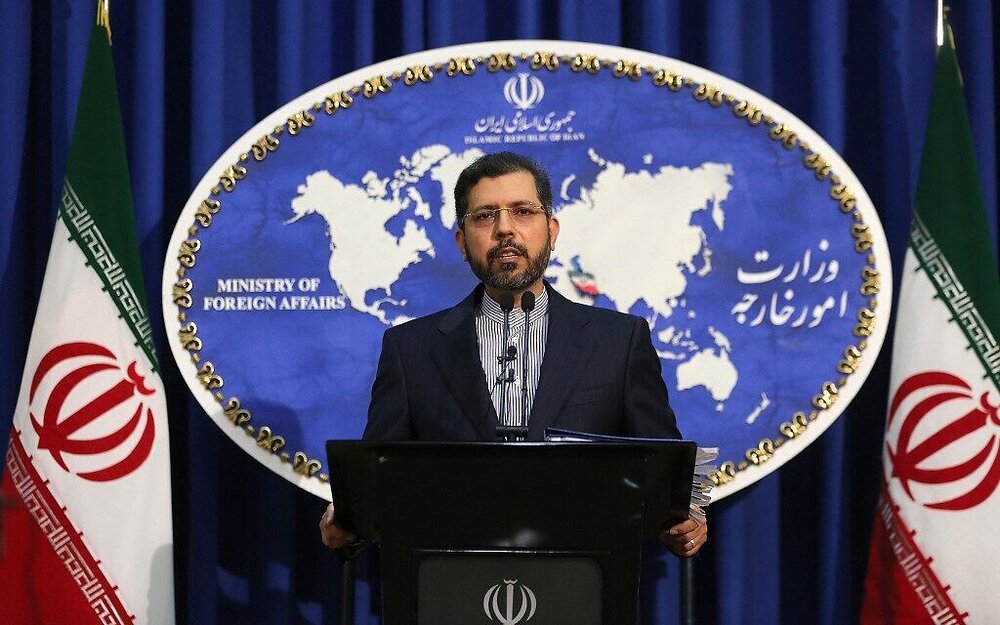Iran: We are waiting for U.S.-E3 response in Vienna

TEHRAN— The Iranian foreign ministry spokesman on Monday reiterated that the 2015 nuclear agreement can be revived soon if the other sides come up with a response to Iran’s initiatives.
“If the day after the delegations return to Vienna, they respond correctly to what has been said to them as the natural rights of Iran and to the texts that Iran has given them, and if they keep their demands within the framework of the Joint Comprehensive Plan of Action (JCPOA), we can reach a lasting, good and reliable agreement the next day, and there is no need for artificial deadlines,” Saeed Khatibzadeh told reporters during his weekly presser.
He added that the other sides are aware of the differences and must make political decisions, especially in Washington.
Khatibzadeh said that Iran is waiting for the political decisions in Washington which may be announced when the U.S. delegation will return to Vienna.
He then noted that there are significant differences among Iran and P4+1.
"In the field of sanctions removal, there are still important and significant issues that have not made the agreement possible to date. In the realm of verification and guarantees that can assure Iran that the United States will not ridicule international law and won’t target the international companies with extraterritorial sanctions, and that our citizens will not be held hostage again under the false pretext of circumventing sanctions, there are still unsolved issues,” he reiterated.
The spokesman stressed that the progress should be made in a completely acceptable manner by Iran so that Tehran can close the case in terms of obtaining guarantees.
Khatibzadeh continued, “The history we have of the implementation of the JCPOA by the United States and some European countries is not a good record. Problems have been identified and in the area of verification all ideas have been clearly written… The Iranian delegation has written creatively, especially during the last three weeks, and today we are waiting for the response of the other parties, and we hope to achieve a good result in the shortest possible time in the field of lifting sanctions.”
He added that the government has made significant progress in neutralizing sanctions and it won’t tie everything to the Vienna talks.
Regarding remarks by a British foreign office official, Khatibzadeh said that the British negotiators need to get their officials out of confusion about what is happening in Vienna.
The diplomat stated, “What is the definitive right of Iran in the field of peaceful nuclear technologies, will remain unchanged, and beyond that, what is guaranteed in the JCPOA has been the minimum of Iran's will. We consider the 2015 nuclear deal to be the framework of the other side's commitments. If their statements have domestic use, I will not enter into that area.”
He noted that Britain has made very shrill statements these days that should be questioned.
Regarding the phone call between the Iranian president and his French counterpart, Khatibzadeh said that Iran and France, as two important countries in the P4+1 group, have held talks both in Vienna and at the level of president.
“The two presidents had telephone conversations on several other occasions. Iran's positions were well explained and some points were exchanged, which we hope to see the result in the coming days,” he reiterated.
Regarding the Qatari foreign minister’s visit to Iran, the spokesman said that the visit followed phone consultations, and some consultations needed to be held on bilateral, regional and international issues.
He added, “Just as we do not discuss regional issues with trans-regional countries, we move forward with the P4+1 issues within its own legal and international framework.
What is happening in Vienna is on a professional path and some speculations must be neglected,” he noted.
Khatibzadeh added that in the last three weeks, the negotiations have made significant progress in all four key points of lifting sanctions, nuclear commitments, verification and obtaining guarantees, although in some areas they have been more significant and faster, and in others due to the inaction of the other side and lack of necessary decisions or lack of initiative and creativity by the other side, there have been delays.
“We recommend that after returning from their capitals, the delegations return with the necessary decisions so that we can quickly summarize what we have drafted,” he stated.
The spokesman concluded by saying that if the other parties, especially the United States, have made their own decisions and do not demand anything more than the JCPOA, a stable, reliable and good agreement can be reached quickly.
Leave a Comment